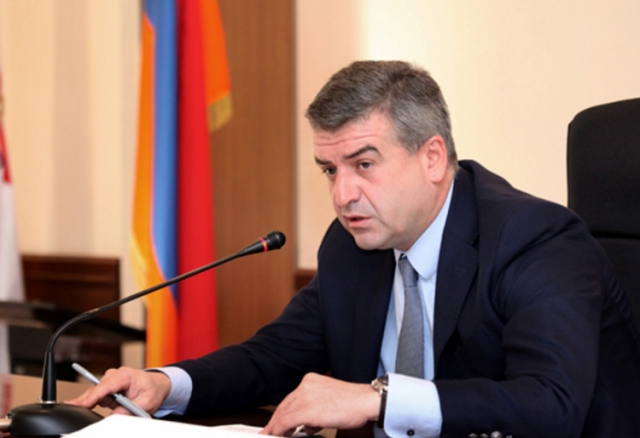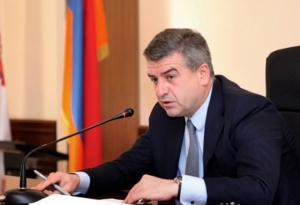Armenia Taps Ex-Gazprom Exec as New Prime Minister
Armenia Taps Ex-Gazprom Exec as New Prime Minister
YEREVAN – Months of social and political upheaval in Armenia came to a head earlier this week as former Gazprom executive Karen Karapetyan was named the tiny South Caucasus nation’s new prime minister.
In an official statement released Wednesday, Armenia's presidential press service said Sargsyan had signed a decree appointing Karapetyan as prime minister on September 13.
The 53-year-old Karapetyan previously served as the chief executive of the Armenian-Russian joint venture, ArmRosGazprom, before becoming mayor of Armenia's capital Yerevan from 2010-11.
Karapetyan later moved to Moscow, where he was personally appointed by Alexey Miller – the CEO of Russia’s state-run gas giant Gazprom and a close confident of Russian President Vladimir Putin - as the first vice president of Gazprombank.
Miller appointed Karapetyan as deputy CEO of Gazprom's Mezhregiongaz unit, before later tapping him as a deputy director-general of another Gazprom subsidiary Gazprom Energoholding in 2015.
Gazprom fully controls Armenia's gas and electricity supply, as well as its vitally important distribution networks via its local gas-import subsidiary, Gazprom Armenia.
Karapetyan’s predecessor, former Prime Minister Hovik Abrahamyan, resigned on September 8 amid growing criticism of his government’s inability to tackle a growing number of crises in the country.
Abrahamyan’s government had been widely criticized by President Serzh Sargsyan’s inner circle for its handling of a four-day conflict with arch rival Azerbaijan over the breakaway region of Nagorno-Karabakh and it’s inability to halt mass street protests supporting a controversial opposition political party who opposed the increasingly authoritarian policies of Sargsyan
Rumors that Abrahamyan would be sacked had circulated for weeks before his official announcement, as both Sargsyan and close ally Russia had grown impatient with Abrahamyan’s perceived ineffective leadership in light of growing civil unrest.
Sargsyan's choice of Karapetyan is widely being viewed as having been orchestrated by Moscow as the Kremlin has grown increasingly alarmed at the Armenian public’s support for opposition parties and civil activists.
The Armenian public’s widespread support for the mass protests known as Electric Yerevan that broke out in July 2015 as a response to steep utility price hikes, and this summer’s sizeable demonstrations in support of a fringe opposition group demanding the release of political prisoners and Sargsyan’s immediate resignation, are thought to have caught both Sargsyan’s inner circle and the Kremlin off guard.
Russia is particularly opposed to the growth of grassroots civil disobedience movements, with Putin paying a watchful eye on the former Soviet republics where Moscow continues to hold significant sway.
Ever since Georgia’s 2003 Rose Revolution and Ukraine’s Euromaidan Revolution in 2013-14 ousted pro-Moscow leaders in favor of pro-Western governments, the Kremlin has attempted to shore up its strategic influence in countries such as Armenia – one of five ex-Soviet states that comprise the Russian-led Eurasian Customs Union – as means of halting the spread of citizen-led democratic movements on its borders.
In addition to owning a controlling stake in all of Armenia's strategic assets, Russia maintains a huge military presence in the country. Moscow's permanent base in the northern Armenian city Gyumri is the second largest contingent of Russian troops based in the South Caucasus after the detachments it has in Georgia's Moscow-backed separatist regions of Abkhazia and South Ossetia. Russian troops patrol Armenia's borders with its far larger neighbor and traditional rival, Turkey.
The landlocked nation’s deep reliance on aid and direct investment from Russia has stunted its economic growth and forced it to become a de facto dependent of Moscow. Armenia relies heavily on remittances from its citizens working in the Russian Federation, which is a badly needed source of income and a key contributor to the country’s Gross Domestic Product.
By Nicholas Waller












